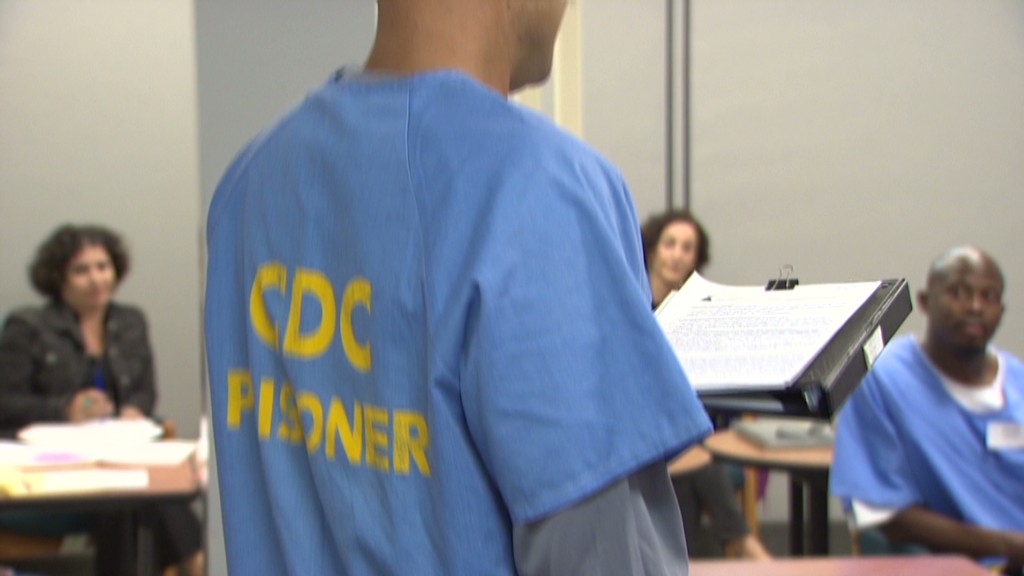
The next great tech startup could emerge from a classroom full of men serving double-digit sentences for offenses ranging from car-jacking to murder.
Launched in 2010, The Last Mile is a tech incubator at San Quentin State Prison. Many of the inmates in the program will spend years in prison and some may never leave, but TLM is aimed at helping them find their voice and, for those who do leave, a job.
Like many entrepreneurs, founders Chris Redlitz and his wife, Beverly Parenti, set out to fix a problem.
"In California, we spend more for prisons than for higher education," Parenti said. "The average cost per prisoner per year is $45,000. So when many men leave San Quentin, we have already invested nearly $1 million for their incarceration."
Two nights a week, a select group of inmates gather to learn about technology and innovation. To get into the Last Mile, inmates complete the in-prison college program. They also go through a rigorous application process and must demonstrate the ability to work well in teams. They're mentored by Redlitz and Parenti along with tech entrepreneurs from companies like Quora and LinkedIn (LNKD) who drop by for guest lectures.
Throughout the six-month course, each inmate cultivates a business idea. At the end of the program, they pitch their concepts to venture capitalists and program supporters like M.C. Hammer. Past ideas have ranged from a food distribution startup connecting leftover produce with impoverished communities, to ways to combat obesity in low-income neighborhoods.
Related: Best social network for your business
The inmates also learn about modern ways to connect: Even though San Quentin is less than an hour from tech giants like Facebook (FB) and Twitter (TWTR), many of the inmates have never logged on to either service. They learn to tweet by filling out 140-character forms that are later tweeted for them; they answer questions from the outside world on Quora via volunteers in the program. For those behind bars, social media tools are a way to connect and find their voice in what can often be an extremely isolating environment.
"There's so much more to us than the crimes we committed ... Social media gave us an outlet to speak to who we really are," former inmate Kenyatta Leal said.
For Leal, who was incarcerated nearly two decades ago when flip phones were the smartest devices on the market, the program has been invaluable. At The Last Mile, Leal pitched an idea for Coach Potato, an app that would allow fans to call plays during games. Because of his success in the program, Leal left prison with a job many college grads would envy.
The ex-con is working as an operations associate at Rocketspace, a co-working and community space for tech startups in San Francisco.
He's not the only Last Mile grad to get a job in the startup community. After 17 years in prison, James Houston is interning at payments startup Ribbon. He connected with the company through TLM.
"I believe a lot of us, we started getting in trouble because we thought outside the box," he told CNNMoney. "Instead of redirecting that in a positive way, we were just kinda outcasts because of it."
Related: How to launch a second startup
Of the six TLM graduates who have been released, five are either interning or working full-time at tech startups, and the sixth started his own web consulting firm.
For many, the program is viewed as a way back into society.
"[The Last Mile is] the light at the end of the tunnel for those guys that are ultimately desiring to exit the prison and become valuable citizens again," said Lt. Sam Robinson, the public information officer at San Quentin who tracks the progress of participating inmates.
Hercacio Harts graduated TLM and was released after eight and a half years last March. He's now working full-time in business development at crowdfunding startup Rally.org.
"I spent many years reading books and magazines and thinking that no one's going to hire me," Harts said. "For my family structure, it's been really helpful for my kids to see me not in blue, [but] as a returned citizen."
The Last Mile's success hasn't gone unnoticed. L.A. County Prison adopted the same program and Redlitz said others are considering similar ones.
Inmates say their prison experience makes them uniquely suited to becoming entrepreneurs:
"Being in prison, having to survive in this type of lifestyle, that's one thing prison does teach you, is how to be resilient and really try to win against all odds," inmate James Cavitt said.



